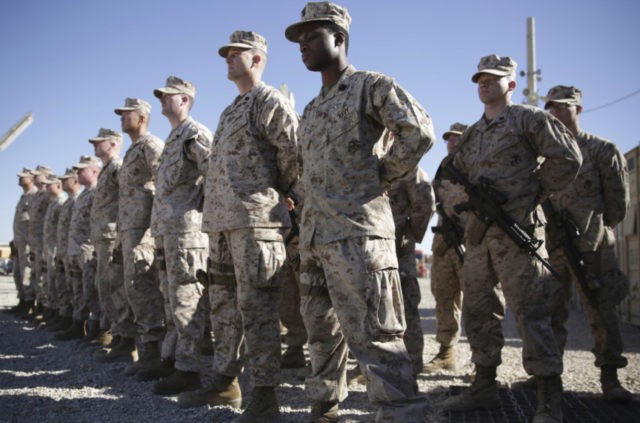The Taliban’s chief negotiator in talks to end the more than 17-year-old war in Afghanistan recently declared the United States is “on the verge of defeat” and will soon withdraw willingly or by force, Voice of America (VOA) reported Monday.
Sher Mohammad Abbas Stanekzai, the Taliban’s political chief, reportedly made the assertions in an April 28 speech to an “internal gathering” in Qatar, two days before he led a jihadi delegation into a fresh round of talks with American interlocutors.
On Friday – a day after America’s top peace negotiator, Zalmay Khalilzad, and his team concluded a week-long round of discussions with the Taliban representatives in the Qatari capital of Doha without a breakthrough – social media outlets friendly to the terrorist group released a video of Stanekzai’s speech.
The Taliban negotiator praised what he described as the bravery of the Afghans who defeated past British and Soviet invasions of their country and continue to resist the current foreign military occupation, referring to the U.S.-NATO coalition currently training, assisting, and advising Afghan troops in battles against the terrorist group.
Stanekzai declared:
God has helped us defeat three superpowers in the last century. The third superpower that we are currently confronted with is also on the verge of defeat, inshallah [God willing]. You will soon hear they also will withdraw [from Afghanistan] either of their own accord or they will be forced out. …We pray to God they [U.S.] withdraw in a manner that results in peace and stability in Afghanistan, and an Islamic system or Sharia is established in Afghanistan, and there is no further bloodshed among Afghans.
VOA learned from Taliban spokesman Zabihullah Mujahid that the April 28 internal gathering was aimed at commemorating the day in 1992 when Afghan jihadis overthrew the communist regime in Kabul.
Stanekzai lambasted Afghan President Ashraf Ghani during his speech, comparing him and his allies to government leaders who supported Moscow during the Soviet occupation of Afghanistan in the 1980s that ultimately gave rise to the Taliban and al-Qaeda.
Over the weekend, former U.S. Defense Chief Robert Gates warned that there is a “real risk” the Taliban will retake control of the country if American troops leave before the Afghan government is stable.
Ghani has warned that the Afghan government and troops would collapse without U.S. support and assistance.
Conceding that a military victory is impossible at this juncture, U.S. President Donald Trump’s administration has intensified peace negotiations with the Taliban, fighting to establish a sharia-compliant Islamic emirate in the country. The war in Afghanistan has been at a stalemate for years.
Trump administration officials made the reconciliation between Kabul and the Taliban the primary goal of its strategy to end the conflict. Taliban narco-jihadis, however, have refused to allow the Afghan government it considers an American puppet to participate in the negotiations.
The Taliban, which the U.S. government believes controls or contests nearly half of Afghanistan, maintains that it will only engage Kabul after foreign forces withdraw from Afghanistan.
Although the Taliban wants foreign forces out of Afghanistan, they want to keep nation-building funds paid for by the American taxpayer flowing into their country. Taliban jihadis, who have repeatedly rejected President Ghani’s offer of a ceasefire and official recognition as a political group, have intensified their attacks amid the peace negotiations with the United States.
The war in Afghanistan has come at a tremendous blood and treasure cost to the United States of nearly $1 trillion, 2,285 American military deaths, and 20,452 injuries.
A reconciliation agreement could grant the Taliban the opportunity to return to office in Kabul. U.S. troops removed the Taliban regime from office in December 2001 for sheltering al-Qaeda before the September 11, 2001, attacks. The Taliban and al-Qaeda remain close allies, according to the United Nations. Both continue to operate in Afghanistan.
So far, peace negotiations have yielded some draft agreements, namely the withdrawal of U.S. troops in exchange for Taliban assurances that it will not allow international jihadi groups such as its ally al-Qaeda and enemy the Islamic State (ISIS/ISIL) from operating on Afghan soil.
The Taliban has rejected Trump administration proposals for a residual American counterterrorism force to remain in Afghanistan following a significant withdrawal to ensure the terrorist group keeps its promises.
Last week, Khalilzad noted on Twitter that the two sides are making “steady but slow progress on aspects of the framework for ending the Afghan war.” He pointed out, however, that the current pace of negotiations is insufficient when you consider that “so much conflict rages and innocent people die.”
“We need more and faster progress. Our proposal for all sides to reduce violence also remains on the table,” Khalilzad said.
Echoing other jihadi groups, the Taliban has urged Muslims to escalate attacks during the ongoing holy month of Ramadan.

COMMENTS
Please let us know if you're having issues with commenting.